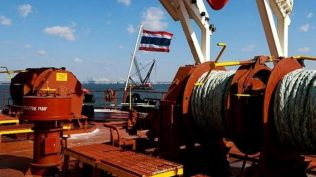Baltimore investigation turns to ship’s deadly mechanical failure
Just minutes before the cargo ship Dali was set to glide under Baltimore’s Francis Scott Key Bridge, the ship’s alarms began to blare. The lights went out. The engine halted. Even the rudder, which the crew uses to maneuver the vessel, was frozen.
As a frantic effort to restore the ship was underway, the pilot soon recognized that the aimless vessel was drifting toward disaster, and called for help.

The cascading collapse of the vessel’s most crucial operating systems left the Dali adrift until it ultimately collided with the Key bridge, knocking the span into the river and killing six people.
What could have caused such a catastrophic failure?
Engineers, captains and shipping officials around the world are waiting for that answer in an era when the industry’s largest ships can carry four times as much cargo as those just a few decades ago, navigating through congested urban ports under bridges that may carry tens of thousands of people a day.
Already, a few key questions are emerging, according to engineers and shipping experts monitoring the investigation, and most of them point to the electrical generators that power nearly every system on the 984-foot vessel.
The “complete blackout” reported by the pilot is hard to explain in today’s shipping world, in which large commercial vessels now operate with a range of automation, computerized monitoring, and built-in redundancies and backup systems designed to avert just such a calamity.
Yet there is a wide range of possible factors contributing to the failure.
If there was faulty maintenance, it could have caused a delay in starting the emergency backup generator, or an electrical fault could have prevented it from remaining engaged. Contaminated fuel or an inadvertently closed valve could have fouled or starved the main generators. Human error could have set off problems or failed to overcome them. The ship’s own automation could have led to equipment glitches. Or a fire could have broken out and damaged crucial equipment.
The answers will have implications not only for international shipping but also for who is liable for damages that S&P Global Ratings estimated at more than $2 billion.
Grace Ocean Private, the Singapore-based company that owns the Dali, said it was “fully cooperating with federal and state government agencies.” While the Dali was insured, the company potentially faces large claims against it, depending on the findings.
Disclaimer: The copyright of this article belongs to the original author. Reposting this article is solely for the purpose of information dissemination and does not constitute any investment advice. If there is any infringement, please contact us immediately. We will make corrections or deletions as necessary. Thank you.





